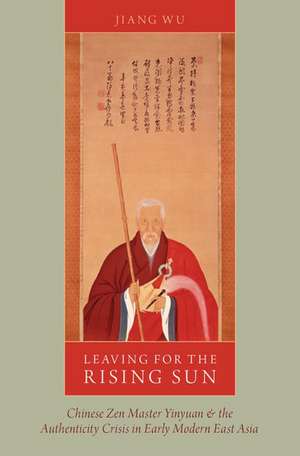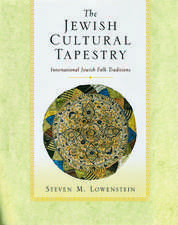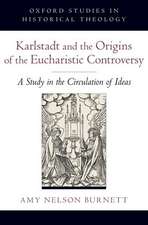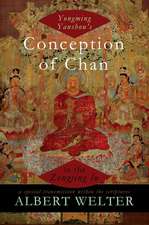Leaving for the Rising Sun: Chinese Zen Master Yinyuan and the Authenticity Crisis in Early Modern East Asia
Autor Jiang Wuen Limba Engleză Paperback – 15 ian 2015
| Toate formatele și edițiile | Preț | Express |
|---|---|---|
| Paperback (1) | 285.96 lei 31-37 zile | |
| Oxford University Press – 15 ian 2015 | 285.96 lei 31-37 zile | |
| Hardback (1) | 777.32 lei 31-37 zile | |
| Oxford University Press – 15 ian 2015 | 777.32 lei 31-37 zile |
Preț: 285.96 lei
Preț vechi: 348.88 lei
-18% Nou
Puncte Express: 429
Preț estimativ în valută:
54.72€ • 57.28$ • 45.54£
54.72€ • 57.28$ • 45.54£
Carte tipărită la comandă
Livrare economică 20-26 martie
Preluare comenzi: 021 569.72.76
Specificații
ISBN-13: 9780199393138
ISBN-10: 0199393133
Pagini: 384
Dimensiuni: 155 x 231 x 33 mm
Greutate: 0.84 kg
Editura: Oxford University Press
Colecția OUP USA
Locul publicării:New York, United States
ISBN-10: 0199393133
Pagini: 384
Dimensiuni: 155 x 231 x 33 mm
Greutate: 0.84 kg
Editura: Oxford University Press
Colecția OUP USA
Locul publicării:New York, United States
Recenzii
In this wonderfully informative study, Jiang Wu extends the significance of his previous, groundbreaking book, Enlightenment in Dispute, from China into the greater East Asian sphere of the seventeenth and eighteenth centuries. Through the career and legacy of the eminent monk Yinyuan Longqi (1592-1673) in China and Japan, Wu penetrates the crisis of cultural legitimacy that beset East Asia, particularly Tokugawa Japan, after the demise of the Ming dynasty.
Notă biografică
Jiang Wu is an associate professor in Department of East Asian Studies at the University of Arizona. His research interests include Chinese Buddhism, especially Chan/Zen Buddhism and the Chinese Buddhist canon, Sino-Japanese Buddhist exchanges, and the application of spatial analysis tools in the study of religion and culture. His first book Enlightenment in Dispute: The Reinvention of Chan Buddhism in Seventeenth-century China was published by Oxford University Press in 2008.














